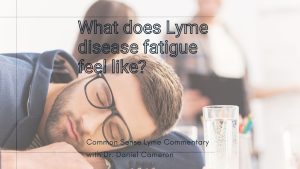
“Our case emphasizes that Lyme disease is capable of causing a mix of symptoms, which may be difficult to interpret, leading to a delay in diagnosis,” the authors write. And these symptoms may “develop consecutively further obscuring the clinical picture.”
A 69-year-old male presented to the hospital with abdominal pain and hyponatremia, a condition that occurs when the level of sodium in the blood is too low.
Four weeks earlier the man noticed a rash on his elbow, which resolved after one week. He also developed a decreased appetite, anorexia, abdominal fullness, chills, headache, fatigue, and myalgias and complained of having an acute onset of constipation.
“There should be a high alert of atypical presentation of this common tick bite associated infection,” the authors write.
Testing for Lyme disease was positive, and the patient began treatment with IV ceftriaxone.
Several days later, he developed Bell’s palsy, along with urinary retention, which required catheterization.
“Our case highlights the importance of including neurological Lyme disease as a possible diagnosis in individuals who present with symptoms of autonomic dysregulation….”
Two days after antibiotic treatment was initiated, the patient developed symptoms believed to be due to a Herxheimer reaction. The authors write, “the patient was found to be tachycardic, weak, diaphoretic, and febrile.”
Test results “suggested that Lyme carditis and NSTEMI were unlikely, and that these symptoms could be a Jarisch–Herxheimer reaction.” He was then switched to IV doxycycline.
At his 3-month follow-up appointment, the man’s symptoms had resolved completely.
“In our patient, an extremely rare mix of symptoms including SIADH, urinary retention, and constipation together with facial neuritis was observed.”
SIADH also known as syndrome of inappropriate antidiuretic hormone secretion is a condition in which high levels of a hormone cause the body to retain water.
Authors conclude:
“Our case highlights the importance of including neurological Lyme disease as a possible diagnosis in individuals who present with symptoms of autonomic dysregulation such as hyponatremia due to an SIADH-like syndrome, urinary retention, anorexia, constipation, and facial palsy.”
Related Articles:
Are gastrointestinal problems in Lyme disease due to autonomic dysfunction?
Could autonomic dysfunction lead to pain in Lyme disease?
Abdominal pain, ileus and constipation due to Lyme disease
References:
- Leone M, Iqbal A, Hugo Bonatti JR, Anwar S, Feaga C. A Patient with SIADH, Urinary Retention, Constipation, and Bell’s Palsy following a Tick Bite. Case Rep Nephrol. 2022 Jul 11;2022:5937131. doi: 10.1155/2022/5937131. PMID: 35859789; PMCID: PMC9293531.



Why is Lyme not listed as a debilitating desease with Social security disability?
Listed
Social Security does not appear to approve disability due to a disease. They focus on the disability caused by a disease.
Hello Dr Cameron,
I have a chronic Lyme, with Bartonella henselae 1/512 and Babesia 1/64 IGG positive, i’m from France. I became ill since two years, and I was given doxycycline and amoxicillin, it got better but new symptoms appeared afterwards… Every two weeks, many red scratches (not stretch marks) appear in several places on my body and often precede the symptoms; I also have trouble swallowing, and abdominal pain that comes and goes, arbitrarily. A few months ago, ventricular extrasystoles appeared, but the cardiological examinations are normal for the moment. I follow you regularly from France, I met you through Laura Arnal, and I would have liked to consult you but I’m so far away… I was advised to take ceftriaxone intravenously, but I never took it, because at the beginning I was doing a lot of herx. Today I no longer herx, but the symptoms that I described to you are moving and migrating everywhere (leg pain on Monday, neck pain on Tuesday.) Which shows, in my opinion, that I don’t I’m not in Post Lyme Syndrome, but still in active disease.
What can I do, I want to do this IV cure (over 21 days) but I don’t know if it will be beneficial to me (I have no comorbidities and I have already had intramuscular ceftriaxone so I don’t think I’m allergic.
Thank you very much for your work and your investment, I wish you the best.
Respectfully.
Naim Merzouki
I am sorry to hear you are still ill. I am unable to make any recommendations without an examination. I advise my patients that 3 weeks of IV Rocephin may not be enough. I also advise them to be treated for Babesia. There is no IV for Babesia.
I’m scheduled for back fusion Nov 14 th. I’ve been treated for Lyme twice with coinfections. DX with Neuro Lyme by Spinal Tap and positive titers. I’m concerned about the Anesthesia as I’ve had heart issues since Lyme. Mostly Vacoscyncope with irregular heart rate.
Still have many symptoms. Does this put me at a higher risk for this surgery?
I have been to your conferences in Scottsdale AZ at our Lyme conferences
I have patients who have benefited from additional antibiotic treatment for the remaining symptoms. I have found that Lyme disease can exaggerate the severity of the pain. I am planning on a blog discussing a recent article on anesthesia. The article discusses the need for a cardiac evaluation. https://www.aana.com/docs/default-source/aana-journal-web-documents-1/lyme-disease-and-anesthesia-considerations-december-2017.pdf?sfvrsn=5c4041b1_6
I was very ill with Lyme’s in 2019 with just about all the symptoms and Bell Palsy. When Covid started in 2020, my breathing became so bad I was given supplemental oxygen and have been on it since. I am in about 3 stage emphasema, and every so often I have exacerbations of what I always thought was the emphasema, but could I have Chronic Lyme’s Desease? Yesterday, I felt so bad and in the evening I took my first Doxycycline for my emphasema already being on 25 mg. a day of prednisome. Today I woke and was a changed person. It’s a wow day, and feeling so much better. Could it still be Lyme’s flaring up? How would I find out?
I have patients with more than one illness. I hope you find treatment for Lyme helps you.
Help! 15 months ago my husband became very ill with lyme disease symptoms. We recognized them from the tick bite that gave him Lyme 12 years ago and almost killed him. We immediately went to urgent care and got 2 weeks supply of doxicillin and the pain and swelling subsided and he felt fine. Except that, his memory suddenly had huge gaps in it from the past and he couldn’t remember what he had done 3 days ago. We have gone to 3 doctors, including a neurologist for help and explained the Lyme disease to them. After a ct scan and mri they all prounced him perfectly well with no problems visible in the brain nor was there any sign of Lyme in his bloodwork. They dismissed my accounts of his constant memory loss as “selective memory”. They are so wrong. He is aware of the memory problems and they are slowly getting worse and we don’t know what to do or where to go for help. We live in a remote rural area in Ne Oklahoma so there isn’t a major medical facility anywhere close. What do we do?
I have Lyme disease patients with processing issues that are difficult to detect. Brain fog has also been described that is difficult to assess
I was diagnosed with Lyme disease after a long standing infection over 10 years. I was treated with various ABX, got very sick during the process, Herxhimer very intense it did get me feelin better but never the same. It’s been over 20 years since diagnosis and my health has never been the same . Always battling , whole body pain arthritic joint pain my back is a mess with degenerative disc disease and a total hip replacement which I wonder if due to lyme Anxeirty that can snow ball into a complete weakness and feeling like im going to collasp so many issues I’m at a loss. . my lyme Dr. says I still have bartonella . I recently tried methylene blue but could not tolerate the stuff. I’m at a loss as to where to go with all this. And continue to watch my health fail. And suggestions.. How long does it take to get in to see you. I’ve spent thousands and thousands on treatment I’m running on empty..
I am sorry to hear you have been through so much. You are certainly welcome to contact my office 914 666 4665 if you have any questions.